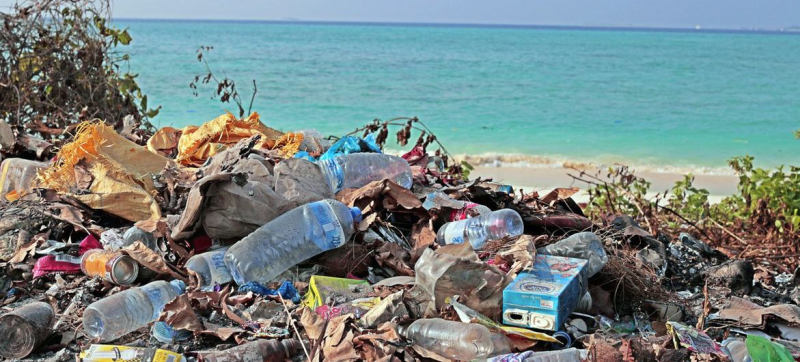- Stocks end lower; trading falls at DSE, improves at CSE |
- No need to be kind to election disruptors: EC to law enforcers |
- No Media Faced Arson Attacks in 53 Years: Mahfuz Anam |
- Janaza of six Bangladeshi peacekeepers held at Dhaka Cantonment |
- Bangladesh stock market loses Tk 10,500cr in a week |
Plastic Talks Stall, but Nations Remain Committed: UNEP Chief

Plastic waste washes ashore in the Maldives archipelago.
The international push for consensus on a legally binding deal to end plastic pollution proved beyond the grasp of weary UN Member States meeting in Geneva on Friday, as they agreed to resume discussions at a future date.
“This has been a hard-fought 10 days against the backdrop of geopolitical complexities, economic challenges, and multilateral strains,” said Inger Andersen, Executive Director of the UN Environment Programme (UNEP). “However, one thing remains clear: despite these complexities, all countries want to remain at the table.”
Speaking at the conclusion of the Intergovernmental Negotiating Committee (INC) talks at the UN in Geneva, Ms. Andersen emphasized that Member States had expressed a clear wish to continue engaging in the process, recognizing their significant differences regarding plastic pollution.
“While we did not finalize the treaty text we hoped for, we at UNEP will continue the fight against plastic pollution – pollution that is in our groundwater, soil, rivers, oceans, and even in our bodies,” she said.
“People are demanding a treaty,” the UN agency head continued, highlighting the hard work ahead to maintain momentum for a binding international accord.
Delegates from 183 nations attended, with some Pacific island representatives – adorned with fresh blooms in their hair – interacting with participants who had endured the final all-night negotiating session.
The resumed fifth session of talks, referred to as INC-5.2 following previous talks in Busan (INC-5.1), gathered more than 2,600 participants at the UN Palais des Nations. This included approximately 1,400 country delegates and nearly 1,000 observers representing over 400 organizations.
Civil society played an active role, including Indigenous Peoples, waste pickers, artists, youth, and scientists. They raised their voices through protests, art installations, press briefings, and events in and around the Palace of Nations.
The negotiations aimed to agree on a text for a legally binding instrument to end plastic pollution and identify unresolved issues requiring further preparatory work ahead of a diplomatic conference, UNEP said.
Four contact groups addressed key issues including plastic design, chemicals of concern, production caps, finance, and compliance instruments.
Despite “intensive engagement,” Members of the Intergovernmental Negotiating Committee were unable to reach consensus on the proposed texts, UNEP explained.
“Failing to reach the goal we set may bring sadness and frustration, but it should not lead to discouragement. On the contrary, it should spur us to regain our energy, renew our commitments, and unite our aspirations,” said INC Chair Luis Vayas Valdivieso.
“It has not happened yet in Geneva, but I have no doubt that the day will come when the international community unites to protect our environment and safeguard the health of our people.”
The INC process began in March 2022 when the UN Environment Assembly passed resolution 5.2 to develop an international legally binding instrument on plastic pollution, including in the marine environment.
“As this session concludes, we leave with an understanding of the challenges ahead and a renewed commitment to address them,” said Jyoti Mathur-Filipp, Executive Secretary of the INC Secretariat. “Progress must now be our obligation.”

